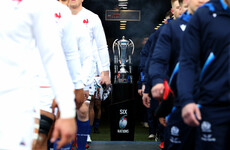IRELAND HEAD COACH Joe Schmidt has expressed concerns about World Rugby’s focus on heavily sanctioning high tackles, while appealing for more consistency in decision-making from referees around such incidents.
The game’s governing body has pushed referees and disciplinary committees to severely punish high tackles and shoulder charges in recent times – aiming to reduce concussion – with the issue coming further into the spotlight ahead of the World Cup in Japan, particularly after World Rugby launched a new framework that aims to ensure referees are more consistent.
The fear for coaches like Schmidt is that refereeing decisions in this area will be decisive in big games at the World Cup, and the Ireland boss is still not convinced that match officials are being consistent enough – echoing Eddie Jones’ recent comments.
“There’s always things that concern us – injury is one and suspension is the other,” said Schmidt yesterday in Portugal.
“I think there was one red card in the last World Cup and there were 17 citings. That’s a massive disconnect between what the citing commissioners were doing and what the referees thought in real-time.
“So, for us trying to predict what’s going to happen and what decisions are going to be made… for [All Blacks lock] Scott Barrett to get red and the number of other incidents in that game, you go, ‘Well, that’s a red but there’s a whole lot of other things missed.’
“It seems very extreme that it’s zero or red.
“In the World Rugby U20 Championship that’s just gone, there were 26 red and yellow game-changing cards for high tackles. I know that World Rugby will say that we have to go after high tackles and I totally agree.
“But in those 26 red and yellow game-changing cards, there wasn’t a Head Injury Assessment required. Not one concussion.
“And so I think that they are trying to stamp their mark on it before we get to the World Cup and we’re all on alert to say that we’re going to have to be cleaner than clean.
“If you get away with it, fair play to you, but if you don’t, it could be a very severe sanction and you’re going to have to be very careful about it. You know, leading with the shoulder and tucking the arm, that is something that we’ve got to make sure we’re not doing and I can understand why.”
World Rugby’s own analysis from this year’s World Rugby U20 Championship states that there were four red cards and 14 yellows for high tackles and shoulder charges during the tournament, and it’s unclear why there is such a notable discrepancy between the governing body’s numbers and Ireland’s.
As World Rugby looks to reduce concussion rates, head contact has become the hot topic. France lock Paul Gabrillagues learned his lesson the hard way, having been suspended for six weeks for a clearout in last weekend’s win over Scotland, meaning he has essentially been ruled out of the World Cup.
With World Rugby having instructed disciplinary committees that bans for any incident of foul play involving contact with the head and/or neck must start with a six-week entry point, players are aware they could end their own tournament in one tackle or clearout.
“Gabrillagues at the weekend, I’ve only seen the replays, but it looks like he gets his hands down,” said Schmidt.
“It doesn’t look like he’s looking to shoulder charge and it doesn’t look like he’s intentionally [led] with his head but we know that if you get it wrong, you’re in somebody else’s hands and we want control as much of it as we can.”
As for World Rugby’s focus on high tackles, Schmidt has concerns about the unintended consequences of forcing players to go lower into the tackle. His worry is that the current focus is removing choice for the tackler.
World Rugby’s data, collected from games between 2013 and 2015, says that the risk of head injury to both tackler and ball-carrier is 4.3 times greater from a high-contact tackle than a low-contact tackle, but Schmidt points to recent examples of head injury resulting from low tackles.
“World Rugby are trying to make the game safer,” said Schmidt. “Is going after the high tackle the safest way to do it?
“I don’t know because if you’re the tackler, you’re three times more likely to get injured in the tackle than the ball-carrier and you’re the guy who’s being targeted. So I think there’s a balance there somewhere, where we have to make sure that we’re looking after all the players, not just the ball-carrier but also the tackler.
“And it’s a hard balance to get and it’s a hard game to referee and there are so many variables and so many high-speed moments in a game.
“Those milliseconds before contact, if you get get your head down a little bit early and you don’t quite see the change in movement… You know, [Australia prop] James Slipper just gets his head down a little bit early and suddenly he’s connecting with Eben Etzebeth’s knee.
“You saw the same with [Australia hooker] Jordan Uelese into the hip bone and you saw the same with [South Africa scrum-half] Faf de Klerk and Rieko Ioane. Again, those three tacklers, head down maybe a fraction early and people are, you know, there are so many high-speed variables.
“They are the three concussions that have occurred in the six games of the Rugby Championship.
“You’re always looking at that and you’re trying to safeguard your players, not just from being picked up for foul play but also from getting injured in the first place.
“We want to look after players and we’re trying to make sure that they can best look after themselves and have the power of choice in that tackle and leave power of choice as late as possible so that they could stay upright and grab or they can drop low and make their move as late as possible because they are the variables that best protect the tackler.”
Murray joins Bernard and Gavan with all the latest from training camp in Portugal, including a concerning update on Joey Carbery’s fitness. Plus, BBC Scotland’s Tom English explains why the Scots have a negative perception of Joe Schmidt’s Ireland team.
The42 Rugby Weekly / SoundCloud













Can’t help but wonder what if Ferris was still playing that would be a frightening back row.
True. Ferris would be an upgrade on Stander
Two bulldozers! Only one more sleep lads
Can’t wait to see them 3 get stuck in and cause complete mayhem
CJ and SOB are gona tear the frogs a new arsehole
When u think o mahony and Henderson has to come back into this squad,and Wat they both bring to De table,and with the quality ireland have right across all back positions now,and De quality coming through,irish rugby is definitely, at international level,in a great place..
Shame that knob jockey pape won’t be playing. We won’t get to see Seanie give him a cuddle!
Thought ruddock was on bench not TOD?
There was some confusion yesterday but it is the TOD.
It shows the quality we have in the back row when Ruddock can’t get in the 23.
Or when POM isn’t missed. (Tactically, personally we still miss him)
Disagree with that, I am biased against Munster and despite that I think he is arguably Ireland’s best forward – he is always immense when he plays for Ireland – I don’t think Stander, Henry or O’Donnell can match him
I’m a huge POM fan and really think he adds something extra. But if we lose we won’t be saying “of only Peter had been playing”. His replacement doesn’t fall THAT far short.
Just consider for a moment Henderson playing at 6 along with Stander at 8 and O’Brien at 7.
That would be the dream combination
Just need to find pace on the Inge and power in the second row and then we have a team to be feared
I’d have Henderson at second row. Completely fills the position but the advantage of another back row in the loose.
You’d sort of be missing Heaslip at 8 there, lad
Can’t wait for an ireland win..